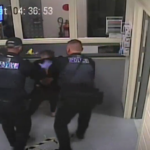NSW Police Force Loses Appeal Against Employee Who Was Allegedly Raped by an Officer

The NSW Police Force has lost its appeal against an employee who left her job and made a claim for compensation after a colleague allegedly sexually assaulted her.
The story so far.
Former NSW police solicitor Lina Nguyen lodged a claim for compensation for discrimination after she was allegedly raped by an officer two years ago.
Ms Nguyen alleges that a detective sexually assaulted her at a park following a farewell party for a superintendent at the Commercial Hotel in Parramatta. She reported the incident to the police the following day.
Ms Nguyen took leave from work and was later transferred from her usual location to an administration building in Woolloomooloo.
She says she was transferred in order to prevent her from coming into contact with the alleged perpetrator, that the new role was inappropriate for her skills and experience, and that if anyone should have been transferred it should have been her alleged abuser.
She was returned to police headquarters for six weeks, but was shifted around according to the whereabouts of her alleged abuser, without a permanent or properly defined role.
She therefore left work and did not return.
Those who report police misconduct are ostracised
Ms Nguyen says the police administration building is a ‘dumping ground’ for injured or troubled police officers, or those who make complaints, report misconduct or otherwise refuse to toe the police line.
An internal police investigation into the alleged sexual assault was concluded at the end of 2019, with Ms Nguyen being told the alleged offender would not be charged or disciplined, and that the force would challenge any claim she made.
Ms Nguyen filed a compensation claim in 2020, with her lawyers arguing she was essentially ‘demoted after reporting the assault’, which aggravated the psychological injury caused by the sexual assault itself.
The Workers Compensation Commission awarded her lost earnings between 29 February and 5 July 2020, when she was deemed to have been partially incapacitated.
However, police appealed the Commission’s decision, arguing there was no aggravation to injury and Ms Nguyen’s psychological injury flowed purely from the alleged sexual assault.
The sexual assault was never the subject of any claim because it occurred at a farewell party, and after the same party, which was not organised, nor sanctioned by NSW Police.
Toxic culture of bullying, harassment and cover-ups
The appeal was dismissed last month, and now NSW Police have three months to decide whether or not they will lodge a further appeal in the New South Wales Supreme Court.
Sadly, Ms Nguyen’s case is not one-of-a-kind.
In recent years a number of internal investigations have backed up claims by current and former police officers that within the NSW Police there is a culture of bullying, harassment and ‘cover-ups’ which ostensibly ostracises those officers who report misbehaviour or misconduct.
This has, over time, coupled with the day-to-day stresses of their roles, led to high rates of depression and PTSD as well as with high rates of attrition — many officers simply leave careers they love because of the unsupportive toxic culture. The number of police officers leaving the force for medical reasons has doubled since 2015.
The ‘Broderick Review’ undertaken by former Australian sex discrimination commissioner, Elizabeth Broderick, which released its findings in 2019, found that two-thirds of female officers felt cliques, in-crowds and the “boys club” formed a barrier to promotion and advancement in their careers, and one in three reported being sexually harassed at work.
At the time, the NSW Police Chief Mick Fuller vowed to make changes, but change has been very slow incoming despite the fact that since then Mick Fuller has been awarded successive pay increases which mean that he now earns more than Prime Minister Scott Morrison.
More evidence of the toxic culture played out in a very public way at the end of last year when it was revealed that at least nine officers from Botany Bay Local Area Command were found to be communicating on a closed WhatsApp group where they exchanged sexualised, inappropriate and offensive messages, including comments about whether new female recruits are “rootable”, whether a woman was “worth the rape charge”, as well as discussions about whether a defendant had been “loaded up” by police – in other words, charged with excessive and/or unwarranted criminal offences.
Dragging important, sensitive issues through the courts
However, there is also another serious issue here: that is the NSW Police Force’s apparent inability to resolve issues quickly in house, providing appropriate support and fair outcomes for employees who have been victimised.
Lina Nguyen has been waiting two years for resolution. Even now, after a long battle through the Worker’s Compensation Commission, NSW Police have the option to take the matter to the Supreme Court, at the expense of taxpayers.
This is their legal right, but it further delays any kind of resolution or outcome for Ms Nguyen causing her further uncertainty and unnecessary stress, and questions should be asked about why this can’t be dealt with in a simpler, simpler, quicker, more empathetic, more cost-effective, less public way.
Ms Nguyen is also suing the NSW Police Force through the NSW Civil and Administrative Tribunal (NCAT) for sexual discrimination.







